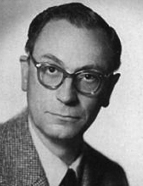

Pierre Hourcade came from a modest social background and owed his rise through the ranks to the encouragement he received from his teachers and the help of the state. He was a brilliant student. After his degree in Lettres Classiques [Classical Letters] , he joined the prestigious École Normale Supérieure [Superior Normal College] on rue d'Ulm in Paris. Léon Bourdon, who had just founded the Lisbon Institut Français [French Institute], and Georges Le Gentil, founder of the first Department of Portuguese Studies at the Sorbonne , suggested to the Director of the École that he should encourage Lusophile vocations among the students. Hourcade took over this task and received a grant to set up in Coimbra the equivalent of the current master's degree, a work entitled Guerra Junqueiro et le problème des influences françaises dans son œuvre . This first stay led him to apply in 1931 to the position of reader in French at the Faculdade de Letras de Coimbra [Faculty of Letters in Coimbra]. In 1932 he was received into the Agrégation de Lettres Classiques [Aggregation of Classical Letters] (a demanding national recruitment competition for secondary School teachers), and in 1934 he was appointed Reader in French at the Faculdade de Letras de Lisboa [Faculty of Letters in Lisbon]. In 1935 he was sent to São Paulo, where he taught French literature at the newly founded Faculdade de Filosofia [Faculty of Philosophy] until 1938. He was then appointed director of the newly created Institut Français in Porto. From 1941 until 1962, he was cultural attaché at the French diplomatic mission in Portugal and director of the Lisbon Institut Français, with a brief interval: he was sacked in 1943 by the Vichy government and replaced at the Institut by Jacques Vier, a disciple of Maurras, who took possession of the eastern part of the Palace de Santos by force on 18 October. Pierre Hourcade was supported by the vast majority of professors (Teyssier and Guibert, among others) in the opening of an Institut in Rua das Praças. By then he was already involved with the organisations resisting collaboration with Nazism, which from June 1944 would make up the Gouvernement provisoire de la République française [Provisional Government of the French Republic]. In September 1944 Hourcade returned to the Palace of Abrantes, and until 1962 he carried out a remarkable Franco-Portuguese cultural dissemination activity.
This work is financed by national funds through FCT - Foundation for Science and Technology, I.P, in the scope of the projects UIDB/04311/2020 and UIDP/04311/2020.
